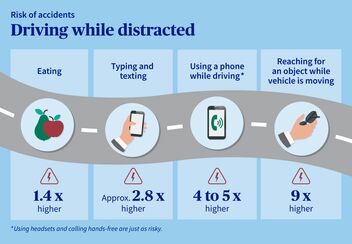
Taking your eyes off the road for two seconds is all it takes to cause an accident. Everyday actions and items can quickly distract you while driving. We explain the seven dangers that cause the most accidents and how you can avoid them.
AXA surveyed more than 1,000 Swiss people and found that they view distractions behind the wheel as the most common cause of accidents – even ahead of speeding. If you're distracted while driving, your reaction time risks being much longer. On top of this, driving without due care and attention can result in sudden, sharp steering movements, overlooking warning signs or a restricted view of the road, all of which can have dire consequences for you and other road users. Learning about the biggest dangers can help you to avoid them. AXA Research & Prevention has drawn up a summary for you.
Attentive drivers are assumed to have a reaction time of up to one second. Trying to do other things while driving can quickly triple this.
The formula for thinking distance shows how this can affect your overall stopping distance: thinking distance = (speed ÷ 10) x 3. This means that, with a reaction time of one second, your thinking distance at 50 km/h is 15 meters. That's 15 meters traveled before you actually hit the brakes! If you're distracted, and your reaction time is three seconds, the thinking distance is also three times as long. In other words, at 50 km/h, you'll only start braking after 45 meters.

Distractions behind the wheel massively increase the risk of accidents Source: BFU (Swiss Council for Accident Prevention)
These actions and items are especially distracting when you're driving day to day. We highlight the risks involved and how you can avoid them.
Many people reach for their phone whenever a message pops up on screen while they're driving. They want to stay up to date or, much worse, reply straight away, but this can have a disastrous effect on their reaction time and road safety in general. Using a phone behind the wheel is now by far the most common cause of accidents. Avoiding reading and sending texts while driving. You should only make calls using a hands-free system and ideally set your phone to mute or driving mode as soon as you get in the car.
Has something fallen down into the footwell? It's best to leave it there until you can park up. If you try to pick it up while driving, you risk heavily restricting your field of vision and jerking the steering wheel, and rooting around on the floor also diverts your attention from the road.
Tiredness is another highly underestimated danger for drivers. AXA's Research & Prevention study revealed that around 16% of Swiss people have nodded off briefly behind the wheel. Some 27% claim to have come close to doing so. If you fall asleep at the wheel, you're driving blind, which can have terrible consequences. The car keeps on moving, but you're not in control of it.
According to the Swiss Council for Accident Prevention (BFU), the risk of accidents is
On longer work or vacation trips especially, it's essential to take regular breaks.
Regardless of whether or not you've muted your navigation device, you're sure to look at the screen sooner or later. Even if it's positioned on or near the windshield, taking your eyes off the road for just a moment is still a dangerous distraction. Turning on sounds and spoken instructions allows you to focus more on the road and other road users. The best approach is to study your route before you set off and make a mental note of the most important intersections so you don't have to rely so much on distracting technology.
Fear, sadness or anger can have a huge influence on how attentive you are. Emotions like these can often lead to ill-considered actions such as driving too fast, making a risky overtaking maneuver or running a red light. Even positive emotions can make you less attentive and negatively affect your driving style. Try to start your journey in as calm a mood as possible.
Just opening a packet means that you have one or, in the worst case, both hands off the wheel. If you spill sauce on your pants, attempting to wipe it off could cause a serious accident. Even drinking out of a PET bottle is not only illegal, it can also restrict your vision or distract you from the road. It's best to eat before you drive or stop for a snack break.
There are around 3,500 medicines available on the Swiss market that can influence your ability to drive (source: BFU). The danger they pose is often underestimated. Many of them suppress your central nervous system, affecting your attentiveness and reactions. Even medicines sold over the counter like cough syrup or eye drops can hinder your driving. Combining different medicines with each other or with alcohol or narcotics massively increases the risk of accidents.
Always read the information included with your medicine carefully and ask your doctor or pharmacist how it could affect your ability to drive. If it has a negative effect, you should refrain from driving altogether after taking it.
The BFU campaign "Ask first, then drive" (German) explains the risks attached to driving under the influence of medication.